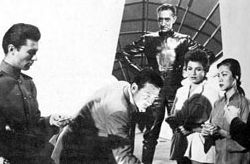Mini Reviews (May 2007)
28 Weeks Later, I Trust You To Kill Me, The 27th Day, The Texas Chainsaw Massacre: The Beginning, Death of a President, Catch and Release
28 Weeks Later (May 8/07)
 Though the creative team behind 2002's 28 Days Later - director Danny Boyle and writer Alex Garland - is only minimally involved this time around, 28 Weeks Later immediately establishes itself as a cousin to its predecessor in both style and tone. After kicking off with an unusually engrossing pre-titles sequence that must just be too effective (ie nothing that follows can live up to its promise), the film continues the story laid out in the original by following a group of survivors (including Robert Carlyle's Don and Jeremy Renner's Doyle) as they contend with the return of the deadly rage virus. Filmmaker Juan Carlos Fresnadillo has infused 28 Weeks Later with a grittiness that proves to be entirely apt, though there's little doubt that his relentless use of jittery camerawork and choppy slow-motion ultimately lends more than a few scenes a lamentably incoherent vibe. Likewise, there's certainly no denying that the film becomes increasingly uneven as it progresses - with some sequences absolutely riveting and others decidedly less so. Yet one can't help but admire the extent to which Fresnadillo emphasizes the more dark and downright disturbing elements within the screenplay; the film, which is consequently quite difficult to watch at times, possesses the sort of bleak atmosphere that's sorely missing from the majority of contemporary horror flicks (John Murphy's memorably chilling score only cements this feeling). That 28 Weeks Later ends with the promise of another sequel isn't necessarily a bad thing, as the series is shaping up to be the most effective take on the recently-revitalized zombie genre. Though the creative team behind 2002's 28 Days Later - director Danny Boyle and writer Alex Garland - is only minimally involved this time around, 28 Weeks Later immediately establishes itself as a cousin to its predecessor in both style and tone. After kicking off with an unusually engrossing pre-titles sequence that must just be too effective (ie nothing that follows can live up to its promise), the film continues the story laid out in the original by following a group of survivors (including Robert Carlyle's Don and Jeremy Renner's Doyle) as they contend with the return of the deadly rage virus. Filmmaker Juan Carlos Fresnadillo has infused 28 Weeks Later with a grittiness that proves to be entirely apt, though there's little doubt that his relentless use of jittery camerawork and choppy slow-motion ultimately lends more than a few scenes a lamentably incoherent vibe. Likewise, there's certainly no denying that the film becomes increasingly uneven as it progresses - with some sequences absolutely riveting and others decidedly less so. Yet one can't help but admire the extent to which Fresnadillo emphasizes the more dark and downright disturbing elements within the screenplay; the film, which is consequently quite difficult to watch at times, possesses the sort of bleak atmosphere that's sorely missing from the majority of contemporary horror flicks (John Murphy's memorably chilling score only cements this feeling). That 28 Weeks Later ends with the promise of another sequel isn't necessarily a bad thing, as the series is shaping up to be the most effective take on the recently-revitalized zombie genre.
   out of out of    
I Trust You To Kill Me (May 13/07)
 Though there's ultimately nothing terribly memorable about I Trust You To Kill Me, the film admittedly does a nice job of documenting one musician's efforts to get his career off the ground - with the added bonus being a peek inside actor Kiefer Sutherland's off-the-set personality. The documentary follows Sutherland as he takes on the role of tour manager for his record label's latest acquisition, Rocco DeLuca & The Burden, and accompanies the band on a small tour of several European cities. Director Manu Boyer has infused the movie with a gritty sensibility that's occasionally more of a distraction than anything else, although - admittedly - the filmmaker does a nice job of capturing the spontaneity of his subjects' exploits. And although some of this stuff is quite interesting (ie the band's first European gig is fraught with problems and screw-ups), there's little doubt that the film becomes increasingly uneven as it progresses - with Boyer eventually dropping the emphasis on the band's misadventures in favor of a more introspective look at DeLuca and Sutherland's respective psyches.I Trust You To Kill Me is subsequently not quite as deep as Boyer seems to think it is, yet it's difficult to overlook the film's sporadic bursts of effectiveness (including, of course, the infamous episode in which Sutherland drunkenly tackles a Christmas tree). Though there's ultimately nothing terribly memorable about I Trust You To Kill Me, the film admittedly does a nice job of documenting one musician's efforts to get his career off the ground - with the added bonus being a peek inside actor Kiefer Sutherland's off-the-set personality. The documentary follows Sutherland as he takes on the role of tour manager for his record label's latest acquisition, Rocco DeLuca & The Burden, and accompanies the band on a small tour of several European cities. Director Manu Boyer has infused the movie with a gritty sensibility that's occasionally more of a distraction than anything else, although - admittedly - the filmmaker does a nice job of capturing the spontaneity of his subjects' exploits. And although some of this stuff is quite interesting (ie the band's first European gig is fraught with problems and screw-ups), there's little doubt that the film becomes increasingly uneven as it progresses - with Boyer eventually dropping the emphasis on the band's misadventures in favor of a more introspective look at DeLuca and Sutherland's respective psyches.I Trust You To Kill Me is subsequently not quite as deep as Boyer seems to think it is, yet it's difficult to overlook the film's sporadic bursts of effectiveness (including, of course, the infamous episode in which Sutherland drunkenly tackles a Christmas tree).
   out of out of    
The 27th Day (May 14/07)
 A typically heavy-handed sci-fi parable from the 1950s, The 27th Day follows five disparate characters (including Gene Barry's Jonathan Clark and Valerie French's Eve Wingate) as they're abducted by benevolent aliens and handed special "killing capsules" that possess the combined power to wipe out all human life on Earth. The quintet is informed that said aliens' planet is virtually inhabitable, and the race will essentially die off if they don't find a new home world. But rather than just destroy humanity themselves, the visitors ask their five subjects to decide which species is more deserving of life. It's an extraordinarily absurd premise that admittedly does start to make a bit more sense as the story unfolds - particularly once governments start to get involved - yet there's just no denying that screenwriter John Mantley's relentless speechifying becomes tiresome almost immediately (ie none of these characters behave or talk in a manner that's even remotely believable). The emphasis on increasingly banal elements - ie the incredibly forced romance that forms between Jonathan and Eve - lends the proceedings a distinctly padded-out vibe, and at a running time of about 75 minutes, it's obvious that the movie would've been much better off as a 22-minute Twilight Zone episode. A typically heavy-handed sci-fi parable from the 1950s, The 27th Day follows five disparate characters (including Gene Barry's Jonathan Clark and Valerie French's Eve Wingate) as they're abducted by benevolent aliens and handed special "killing capsules" that possess the combined power to wipe out all human life on Earth. The quintet is informed that said aliens' planet is virtually inhabitable, and the race will essentially die off if they don't find a new home world. But rather than just destroy humanity themselves, the visitors ask their five subjects to decide which species is more deserving of life. It's an extraordinarily absurd premise that admittedly does start to make a bit more sense as the story unfolds - particularly once governments start to get involved - yet there's just no denying that screenwriter John Mantley's relentless speechifying becomes tiresome almost immediately (ie none of these characters behave or talk in a manner that's even remotely believable). The emphasis on increasingly banal elements - ie the incredibly forced romance that forms between Jonathan and Eve - lends the proceedings a distinctly padded-out vibe, and at a running time of about 75 minutes, it's obvious that the movie would've been much better off as a 22-minute Twilight Zone episode.
  out of out of    
The Texas Chainsaw Massacre: The Beginning (May 27/07)
 A prequel to the recent Texas Chainsaw Massacre remake, The Texas Chainsaw Massacre: The Beginning is an unsightly, pointless, and thoroughly mean-spirited piece of work that has little to offer even the most open-minded horror fan. Set almost a decade before the events of The Teas Chainsaw Massacre, the film follows two couples as they're pursued and tortured by the psychopathic Hewitt family (including R. Lee Ermey's Charlie and Andrew Bryniarski's Leatherface). The movie, ultimately as slick and superficial as its predecessor, possesses a leaden pace that's exacerbated by Sheldon Turner's surprisingly talky screenplay, which also manages to turn virtually every character into a walking cliché (something that applies even to Leatherface himself). There is consequently no reason to care about any of this; the film's "heroes" are undeveloped almost to the point of absurdity, while the Hewitt clan is comprised entirely of increasingly grotesque caricatures. Likewise, the fact that each of the film's antagonists pop up in the 2003 original essentially removes any hope of suspense from the proceedings (ie we know that none of the villains, including the fat tea lady, are going to die and that the two couples are doomed). And, of course, the film features the same sort of relentlessly ugly visuals that viewers have come to expect from Michael Bay's Platinum Dunes production company - with the end result a film that's just a waste of time all around, devoid of anything even resembling positive attributes. A prequel to the recent Texas Chainsaw Massacre remake, The Texas Chainsaw Massacre: The Beginning is an unsightly, pointless, and thoroughly mean-spirited piece of work that has little to offer even the most open-minded horror fan. Set almost a decade before the events of The Teas Chainsaw Massacre, the film follows two couples as they're pursued and tortured by the psychopathic Hewitt family (including R. Lee Ermey's Charlie and Andrew Bryniarski's Leatherface). The movie, ultimately as slick and superficial as its predecessor, possesses a leaden pace that's exacerbated by Sheldon Turner's surprisingly talky screenplay, which also manages to turn virtually every character into a walking cliché (something that applies even to Leatherface himself). There is consequently no reason to care about any of this; the film's "heroes" are undeveloped almost to the point of absurdity, while the Hewitt clan is comprised entirely of increasingly grotesque caricatures. Likewise, the fact that each of the film's antagonists pop up in the 2003 original essentially removes any hope of suspense from the proceedings (ie we know that none of the villains, including the fat tea lady, are going to die and that the two couples are doomed). And, of course, the film features the same sort of relentlessly ugly visuals that viewers have come to expect from Michael Bay's Platinum Dunes production company - with the end result a film that's just a waste of time all around, devoid of anything even resembling positive attributes.
 out of out of    
Death of a President (May 28/07)
 That Death of a President sparked a media sensation at last year's Toronto International Film Festival is nothing short of inexplicable, as the movie - which does possess a fairly intriguing opening half hour, admittedly - eventually morphs into a low-rent and thoroughly dull police procedural (ie there comes a point at which the novelty seriously wears off). Director Gabriel Range - who co-wrote the script with Simon Finch - has crafted a mockumentary set several years in the future, following the assassination of George W. Bush at the hands of an unknown assailant. The majority of film follows Range's efforts to piece together exactly what happened that fateful night, as he interviews various key figures and delves into the FBI's investigation of the murder. There's little doubt that Death of a President's most overt failing is its complete and utter lack of authenticity; aside from Range's use of familiar actors in prominent roles (which instantly kills any credibility the movie might've had), there's an underlying vibe of amateurishness within virtually every aspect of the production that ultimately becomes impossible to overlook (even the extras are unconvincing). That Death of a President sparked a media sensation at last year's Toronto International Film Festival is nothing short of inexplicable, as the movie - which does possess a fairly intriguing opening half hour, admittedly - eventually morphs into a low-rent and thoroughly dull police procedural (ie there comes a point at which the novelty seriously wears off). Director Gabriel Range - who co-wrote the script with Simon Finch - has crafted a mockumentary set several years in the future, following the assassination of George W. Bush at the hands of an unknown assailant. The majority of film follows Range's efforts to piece together exactly what happened that fateful night, as he interviews various key figures and delves into the FBI's investigation of the murder. There's little doubt that Death of a President's most overt failing is its complete and utter lack of authenticity; aside from Range's use of familiar actors in prominent roles (which instantly kills any credibility the movie might've had), there's an underlying vibe of amateurishness within virtually every aspect of the production that ultimately becomes impossible to overlook (even the extras are unconvincing).
  out of out of    
Catch and Release (May 31/07)
 The directorial debut of noted screenwriter Susannah Grant, Catch and Release casts Jennifer Garner as Gray Wheeler - a woman whose life is turned upside down after her fiancée is killed in the days leading up to their wedding. The movie follows her efforts to recover from the loss by leaning on the various people in her life - including friends Sam (Kevin Smith) and Dennis (Sam Jaeger), as well as potential love interest Fritz (Timothy Olyphant). There's nothing particularly noteworthy or innovative about Catch and Release; the film is as predictable an affair as its premise might have indicated, and Grant (who also wrote the screenplay) generally does an effective job of infusing the proceedings with a light-hearted, easy-going sort of vibe. But despite the inclusion of several impressive performances (the sole exception is Smith, who - though entertaining - makes absolutely no effort to step into the shoes of a different person), there's just no denying that the majority of these characters remain sketchily-drawn - to the extent that it becomes awfully difficult to actually care about their various problems. Still, as far as so called "chick flicks" go, one could certainly do worse than Catch and Release (yet one also can't help but note that Grant has written at least a couple of vastly-superior, thematically-similar pictures in the past). The directorial debut of noted screenwriter Susannah Grant, Catch and Release casts Jennifer Garner as Gray Wheeler - a woman whose life is turned upside down after her fiancée is killed in the days leading up to their wedding. The movie follows her efforts to recover from the loss by leaning on the various people in her life - including friends Sam (Kevin Smith) and Dennis (Sam Jaeger), as well as potential love interest Fritz (Timothy Olyphant). There's nothing particularly noteworthy or innovative about Catch and Release; the film is as predictable an affair as its premise might have indicated, and Grant (who also wrote the screenplay) generally does an effective job of infusing the proceedings with a light-hearted, easy-going sort of vibe. But despite the inclusion of several impressive performances (the sole exception is Smith, who - though entertaining - makes absolutely no effort to step into the shoes of a different person), there's just no denying that the majority of these characters remain sketchily-drawn - to the extent that it becomes awfully difficult to actually care about their various problems. Still, as far as so called "chick flicks" go, one could certainly do worse than Catch and Release (yet one also can't help but note that Grant has written at least a couple of vastly-superior, thematically-similar pictures in the past).
   out of out of    
|